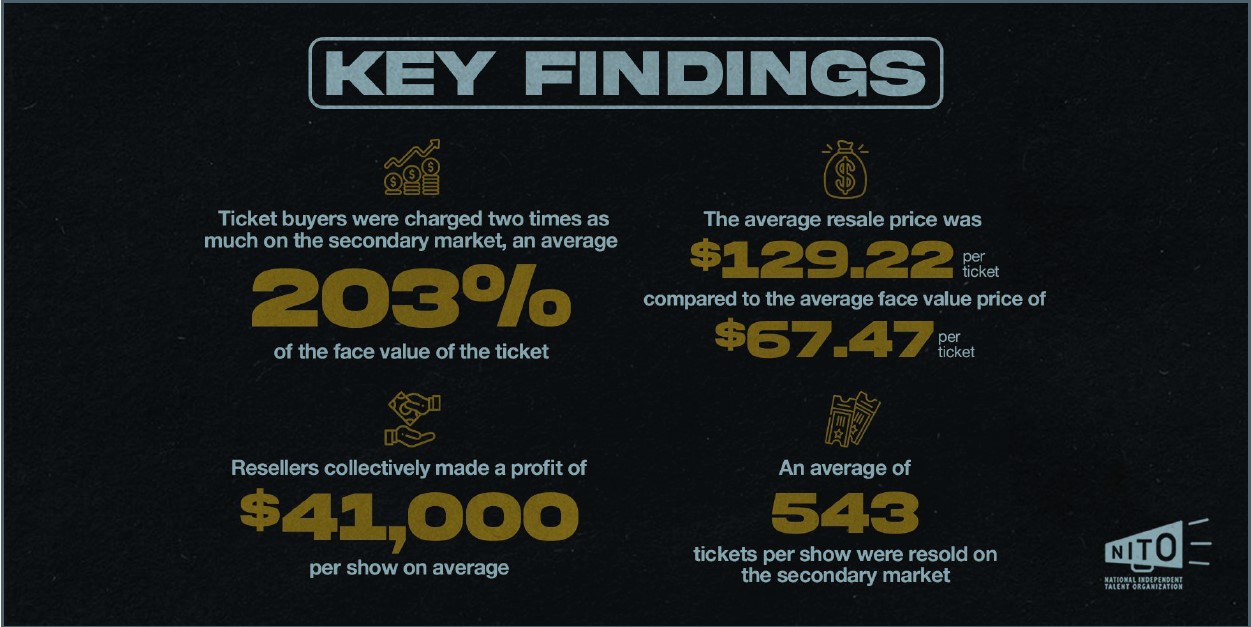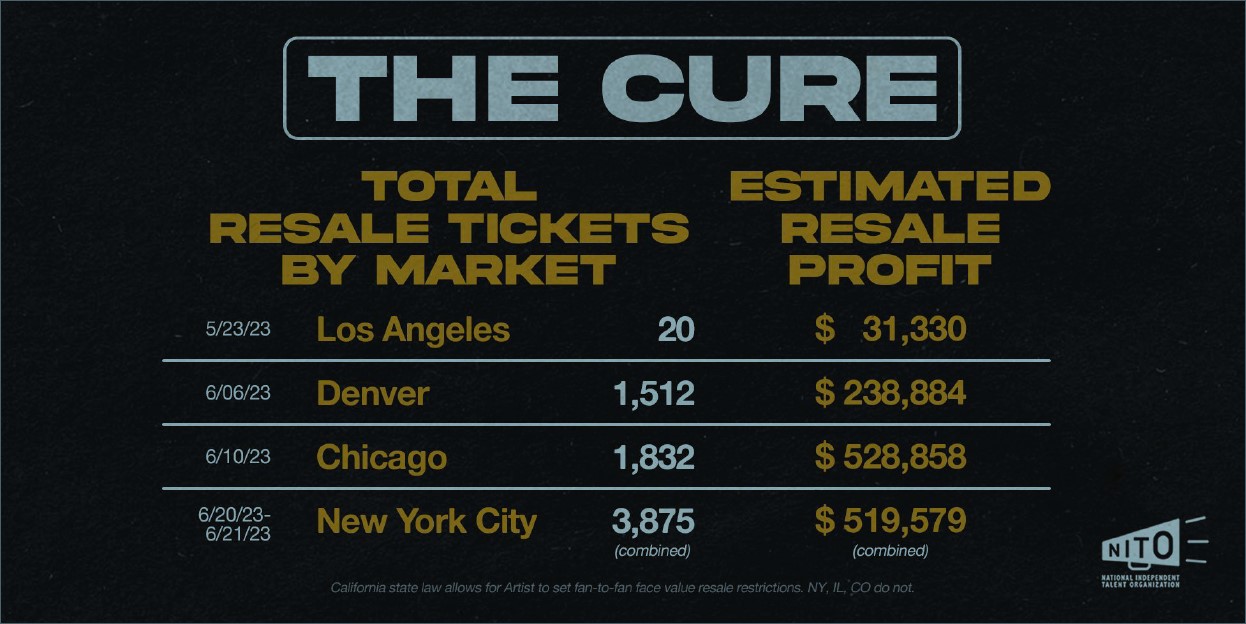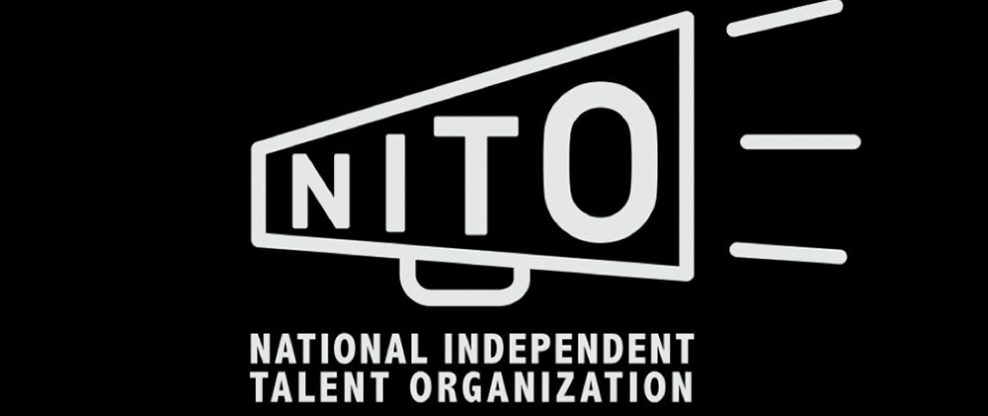SAUSALITO, CA (CelebrityAccess) – Predatory ticket resellers are earning tens of millions of dollars at the expense of consumers, artists, and venues, according to a new study by the National Independent Talent Organization (NITO).
Ticket resellers earned an average cumulative profit of $41,000 per show by charging an average of two times the original ticket price, according to a new analysis by NITO.
NITO’s study found multiple instances of tickets sold at 10 times the original price. In one instance, a ticket was resold for $1,014.49 when the average face value price was just $79.55.
One single show from the study netted an estimated $365,000 gross profit for resellers from the sale of 2,491 tickets at an average resale price of $210.89 per ticket on tickets with an original average face value of $64.48.
The NITO study of tickets sold and resold for 65 random shows by artists represented by NITO members sheds light on the predatory resellers and secondary ticket platforms that are price-gouging consumers and exploiting artists. The venues studied ranged in capacity from 1,500 to 20,000 and the artist’s names were withheld unless permitted.

Key Findings
● Ticket Buyers were charged an average of 203% of face value on the secondary ticket market
● The average face value ticket price was $67.47, and the average resale price was $129.22 per ticket
● Resellers collectively made an average gross profit of $41,000 per show for reselling an average of 543 tickets per show.
Many Tickets Were Resold For Shows That Were Not Sold Out
In many instances, there were a significant number of tickets resold by secondary sellers at inflated prices when tickets were still available from the primary ticket seller. NITO found two possible reasons why.
Ticket buyers are confused by the use of search engine optimization and paid placements within searches that prioritize secondary site listings over the primary ticket seller. So even though inventory was still available on the primary site, they paid a premium to a reseller. Second, some consumers are willing to pay higher prices to sit in seats they could have purchased directly if the ticket reseller had not purchased them first.
Either way, consumers and artists are negatively impacted.
The Cure And Face-Value Ticket Exchanges
NITO also reviewed data from artists not represented by NITO to determine the effectiveness of alternative fan-to-fan face-value exchange systems.
Currently, these exchanges exist formally through primary ticketing platforms and informally through sites like CashorTrade that enable fans to transfer or sell their tickets at or below the original face value.
These exchanges can limit the potential for exorbitant profits by ticket resellers when implemented effectively, However, many state laws don’t allow any type of resale restrictions, making these face value exchanges less effective in those states.
NITO examined the recent tour by The Cure, comparing secondary ticket sales in states where resale restrictions are allowed with those where they are not.
The results were clear.

In California, where resale restrictions are allowed, the number of tickets resold and reseller profits were 92% to 99% less than in states like New York, Illinois, and Colorado, which do not allow restrictions on resale. The open resale laws in the latter states drastically limited the effectiveness of the fan-to-fan exchanges and because of it, those fans were exploited despite the artist’s best efforts. The Cure’s resold tickets in Chicago were on average 396% above the face value price.
Resellers Earned & Fans Overpaid Almost $1 Million For A Single Show
Another arena-level artist used fan-to-fan face-value exchanges with similar dramatic results. There were just 18 total tickets resold for their two LA arena shows and 26 for an Oakland Arena show.
By contrast, for the same artist in New York City, where state law prohibits restrictions on resale,1,053 tickets were resold for a single show at an average price 712% higher than the average face value price.
The study estimated that, collectively, resellers profited $936,351.00 on that one show which also means that consumers overpaid nearly $1,000,000 extra for secondary market tickets.
A prominent country artist, who tours in stadiums and routinely keeps ticket prices lower to allow more fans to attend, had 7,767 tickets sold on the secondary market for a gross of $2,318,610.42. This artist’s average ticket price is $72.16, and they were resold at an average of $298.52, a 313% markup.
While this artist intended to benefit their fans by keeping ticket prices lower, it only allowed for higher profits for resellers.
Conclusions
While many consumer and “fan first” groups claim that the resale market benefits consumers, NITO’s data shows otherwise.
Most consumers can only spend so much on concert tickets each year. So even though the artist sets an original ticket price that they believe is fair, if those tickets are bought and resold at a higher price, consumers can now afford to attend fewer concerts which hurts artists, venues, and live entertainment as a whole.
Fan-to-fan face-value ticket exchanges clearly work and allow fans to buy tickets at the price the artist intended. But too often, State laws limit their effectiveness, preventing fans across the country from benefiting equally.
Most tickets sold on the secondary market are sold by predatory ticketing professionals with access to technology that often assures that they can buy the best tickets before fans. The secondary ticket sites use their excessive profits to push their ticket listings to the top of search results, confusing fans and stifling official ticket sales.
Resellers exploit fans, artists and their crews, venues, promoters, and their staffs – none of
whom benefit from secondary ticket sales.
About NITO
National Independent Talent Organization (NITO) members include several hundred independent music managers and booking agencies and the thousands of musicians that they represent. NITO is a member of the Fix the Tix coalition, led by the National Independent Venue Association (NIVA). The coalition is asking Congress to enact comprehensive legislation
that:
● Restores integrity to the ticketing marketplace by allowing artists and venues to set the terms and conditions of resale
● Safeguards consumers against fake tickets, price gouging, and other deceptive practices
● Provides transparency in ticket pricing with upfront itemized fees
● Guarantees transferability and promotes fan-to-fan face-value ticket exchanges
For more information on NITO, visit www.nitolive.org/, and for the full Fix the Tix platform, visit www.nivassoc.org/fixthetix.
To arrange an interview with a member of the NITO Board or the NITO Ticketing Taskforce, contact NITO Board member and Communications Chair Bruce Houghton of The Skyline Artists Agency at bruce@skylineonline.com or 818.284.3023.





























